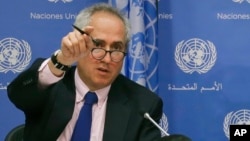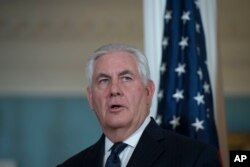The United Nations says it regrets the Trump administration’s decision to pull out of the Global Compact on Migration, but that there is still time for the United States to re-engage in the process.
“This should not disrupt the clear, unanimous outcome of the New York Declaration for such a global compact – which will be non-legally binding, grounded in international cooperation and respectful of national interests,” U.N. Spokesman Stephane Dujarric said Monday.
U.S. Secretary of State Rex Tillerson said in a statement that the compact is not consistent with American immigration policies.
"While we will continue to engage on a number of fronts at the United Nations, in this case, we simply cannot in good faith support a process that could undermine the sovereign right of the United States to enforce our immigration laws and secure our borders," Tillerson said.
He said the United States supports international cooperation on migration issues, “but it is the primary responsibility of sovereign states to help ensure that migration is safe, orderly, and legal."
Compact
The New York Declaration for Refugees and Migrants was adopted on the margins of the U.N. General Assembly’s annual leaders gathering in September 2016. It is the beginning of a process to draft a multilateral agreement that covers all aspects of safe, orderly and regular migration.
The U.S. announcement came just before the start Monday of a global conference on migration in Puerto Vallarta, Mexico. The meeting participants will discuss their recommendations and shape their vision for the global compact.
A State Department spokesperson on Tuesday clarified the U.S. has only decided to end its participation in the U.N. process to develop a Global Compact on Migration and that "the Global Compact on Refugees is a separate process with separate intended outcomes."
U.N. Special Representative for International Migration Louise Arbour spoke with VOA from Mexico on the U.S. decision.
“I think it is unfortunate not to have the benefit of the experience – the very long, positive experience of the United States with migration -- but the process very much has its own momentum and is moving forward very nicely,” she said.
Arbour said the U.S. delegation had engaged in preliminary topical discussions for the past six months and gave her no advance warning that it would withdraw from the process.
The U.N. estimates that there are about 244 million migrants in the world – or just over three percent of the world’s population. The U.N. considers a migrant to be anyone who changes their country, regardless of the reason.
Arbour says migration is an “overwhelmingly positive” story that is often misunderstood.She notes migrants contribute billions of dollars to the economies of their home countries.
“It’s a huge tool of development and a great contribution to every country that’s been hosting migrants in history," she said.
Divided administration
The U.S. mission to the U.N. said in a statement Saturday that the declaration “contains numerous provisions that are inconsistent with U.S. immigration and refugee policies and the Trump Administration’s immigration principles.”
Foreign Policy magazine reported that President Donald Trump’s decision to pull out of the negotiations “highlighted the enduring influence of Stephen Miller, the 32-year-old senior White House policy advisor who has championed the Trump administration’s efforts to sharply restrict immigration” to the United States.
The magazine said White House Chief of Staff John Kelly and Attorney General Jeff Sessions “strongly backed a pullout," while U.S. Ambassador to the United Nations Nikki Haley opposed it.
Haley, the daughter of Indian immigrants, reportedly took the position that Washington could influence the global negotiations on migration if it participated in the Mexico meeting, but she was “ultimately overruled by the president.”












